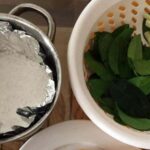Boiling chicken can be a time-consuming task, and it’s not uncommon for homemakers to find that despite their efforts, the bones remain pink or bloody after carving. This often leads to a quick fix of blanching the chicken in hot water to remove the pinkness before serving.

Pink Bones in Boiled Chicken
Why Do Chicken Bones Sometimes Turn Pink During Boiling?
Many people assume that fully cooked chicken meat should be completely white, but this isn’t always the case.
The pinkish hue on the bones or the pinkish liquid that seeps out when cutting into the chicken is not an indication of undercooked meat.
This phenomenon is caused by myoglobin (Mb), a protein found in chicken bones, reacting with air during the cooking process.
At first glance, Mb may resemble blood, leading to the misconception that the chicken is undercooked. However, blood clots quickly when exposed to air.
This occurrence is more common in younger chickens, or “spring chickens,” due to their less developed bone and muscle structure.
This also explains why a rare steak may release some dark reddish liquid when cut, yet it lacks the strong, pungent smell of blood and instead has a sweet taste.
Tips for Preventing Pink Bones and Meat When Boiling Chicken
Rubbing the chicken with lemon and coarse salt during preparation not only helps eliminate odors but also reduces the likelihood of pink bones by minimizing Mb’s reaction to air.
Another method to quickly boil chicken is to separate the meat from the bones, boiling the meat and using the bones to make a separate broth.
“Boil Chicken in Plain Water? Try This Instead for Tender, Flavorful Meat”
With just a few easily accessible spices, such as onions and ginger, you can create a mouth-watering boiled chicken dish that will have your taste buds doing a happy dance. This simple yet flavorful dish is a testament to the power of a few well-chosen ingredients, transforming the ordinary into something truly extraordinary.
“The Ultimate Guide to Boiling Chicken: Achieving Succulent Flavor Without the Need for Water”
The art of boiling chicken without water may seem unusual, but the end result is a delicious, tender, and sweet meat. Today, we will reveal the secrets to achieving this mouth-watering dish, including the use of salt, garlic, and other simple ingredients to create a flavorsome masterpiece.
The Culinary Magic of Lemons
Sure, I can assist you with that.
“You probably already use lemons to make refreshing summer drinks, but did you know they have a multitude of other uses in the kitchen? From preventing fruit discoloration to cooking vegetables and even peeling eggs, lemons are a true culinary multi-tasker. You’ll be amazed at the versatility of this citrus fruit and how it can enhance your daily cooking.”


































